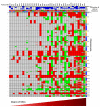Identification of candidate driver genes in common focal chromosomal aberrations of microsatellite stable colorectal cancer
- PMID: 24367615
- PMCID: PMC3867468
- DOI: 10.1371/journal.pone.0083859
Identification of candidate driver genes in common focal chromosomal aberrations of microsatellite stable colorectal cancer
Abstract
Colorectal cancer (CRC) is a leading cause of cancer deaths worldwide. Chromosomal instability (CIN) is a major driving force of microsatellite stable (MSS) sporadic CRC. CIN tumours are characterised by a large number of somatic chromosomal copy number aberrations (SCNA) that frequently affect oncogenes and tumour suppressor genes. The main aim of this work was to identify novel candidate CRC driver genes affected by recurrent and focal SCNA. High resolution genome-wide comparative genome hybridisation (CGH) arrays were used to compare tumour and normal DNA for 53 sporadic CRC cases. Context corrected common aberration (COCA) analysis and custom algorithms identified 64 deletions and 32 gains of focal minimal common regions (FMCR) at high frequency (>10%). Comparison of these FMCR with published genomic profiles from CRC revealed common overlap (42.2% of deletions and 34.4% of copy gains). Pathway analysis showed that apoptosis and p53 signalling pathways were commonly affected by deleted FMCR, and MAPK and potassium channel pathways by gains of FMCR. Candidate tumour suppressor genes in deleted FMCR included RASSF3, IFNAR1, IFNAR2 and NFKBIA and candidate oncogenes in gained FMCR included PRDM16, TNS1, RPA3 and KCNMA1. In conclusion, this study confirms some previously identified aberrations in MSS CRC and provides in silico evidence for some novel candidate driver genes.
Conflict of interest statement
Figures


Similar articles
-
Functionally-focused algorithmic analysis of high resolution microarray-CGH genomic landscapes demonstrates comparable genomic copy number aberrations in MSI and MSS sporadic colorectal cancer.PLoS One. 2017 Feb 23;12(2):e0171690. doi: 10.1371/journal.pone.0171690. eCollection 2017. PLoS One. 2017. PMID: 28231327 Free PMC article.
-
Array CGH identifies distinct DNA copy number profiles of oncogenes and tumor suppressor genes in chromosomal- and microsatellite-unstable sporadic colorectal carcinomas.J Mol Med (Berl). 2007 Mar;85(3):293-304. doi: 10.1007/s00109-006-0126-5. Epub 2006 Dec 2. J Mol Med (Berl). 2007. PMID: 17143621
-
Identification of chromosome aberrations in sporadic microsatellite stable and unstable colorectal cancers using array comparative genomic hybridization.Cancer Genet. 2011 Feb;204(2):84-95. doi: 10.1016/j.cancergencyto.2010.08.019. Cancer Genet. 2011. PMID: 21504706
-
The genomics of sporadic and hereditary colorectal cancer.Ann R Coll Surg Engl. 2024 Apr;106(4):313-320. doi: 10.1308/rcsann.2024.0024. Ann R Coll Surg Engl. 2024. PMID: 38555871 Free PMC article. Review.
-
Molecular pathological classification of colorectal cancer.Virchows Arch. 2016 Aug;469(2):125-34. doi: 10.1007/s00428-016-1956-3. Epub 2016 Jun 20. Virchows Arch. 2016. PMID: 27325016 Free PMC article. Review.
Cited by
-
The Role and Function of Ras-association domain family in Cancer: A Review.Genes Dis. 2019 Jul 27;6(4):378-384. doi: 10.1016/j.gendis.2019.07.008. eCollection 2019 Dec. Genes Dis. 2019. PMID: 31832517 Free PMC article. Review.
-
Tensins in Kidney Function and Diseases.Life (Basel). 2023 May 24;13(6):1244. doi: 10.3390/life13061244. Life (Basel). 2023. PMID: 37374025 Free PMC article. Review.
-
Comprehensive analysis of histone modification-associated genes on differential gene expression and prognosis in gastric cancer.Exp Ther Med. 2019 Sep;18(3):2219-2230. doi: 10.3892/etm.2019.7808. Epub 2019 Jul 24. Exp Ther Med. 2019. PMID: 31452712 Free PMC article.
-
Genetic variants modulating CRIPTO serum levels identified by genome-wide association study in Cilento isolates.PLoS Genet. 2015 Jan 28;11(1):e1004976. doi: 10.1371/journal.pgen.1004976. eCollection 2015 Jan. PLoS Genet. 2015. PMID: 25629528 Free PMC article.
-
Colorectal carcinogenesis: Insights into the cell death and signal transduction pathways: A review.World J Gastrointest Oncol. 2018 Sep 15;10(9):244-259. doi: 10.4251/wjgo.v10.i9.244. World J Gastrointest Oncol. 2018. PMID: 30254720 Free PMC article. Review.
References
-
- Parkin DM, Bray F, Ferlay J, Pisani P (2005) Global Cancer Statistics, 2002. CA: a Cancer Journal for Clinicians 55: 74-108. - PubMed
-
- Derks S, Postma C, Carvalho B, Bosch SMvd, Moerkerk PTM et al. (2008) Integrated analysis of chromosomal, microsatellite and epigenetic instability in colorectal cancer identifies specific associations between promoter methylation of pivotal tumour suppressor and DNA repair genes and specific chromosomal alterations. Carcinogenesis 29: 434-439. - PubMed
-
- Issa J-P (2008) Colon Cancer: It’s CIN or CIMP. Cancer Research 14: 5939-5940. - PubMed
Publication types
MeSH terms
Grants and funding
LinkOut - more resources
Full Text Sources
Other Literature Sources
Medical
Research Materials
Miscellaneous

